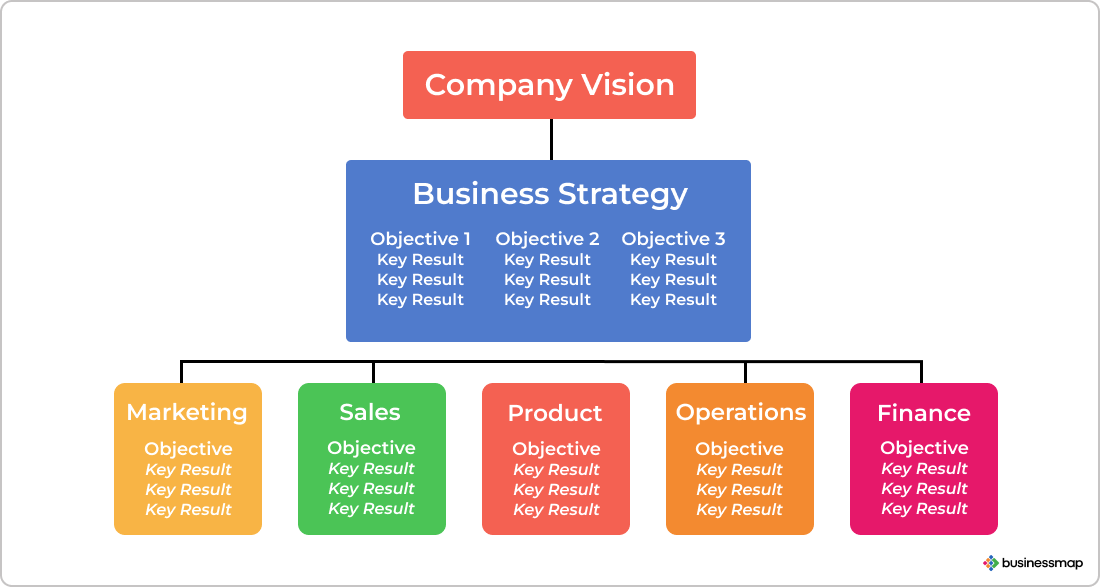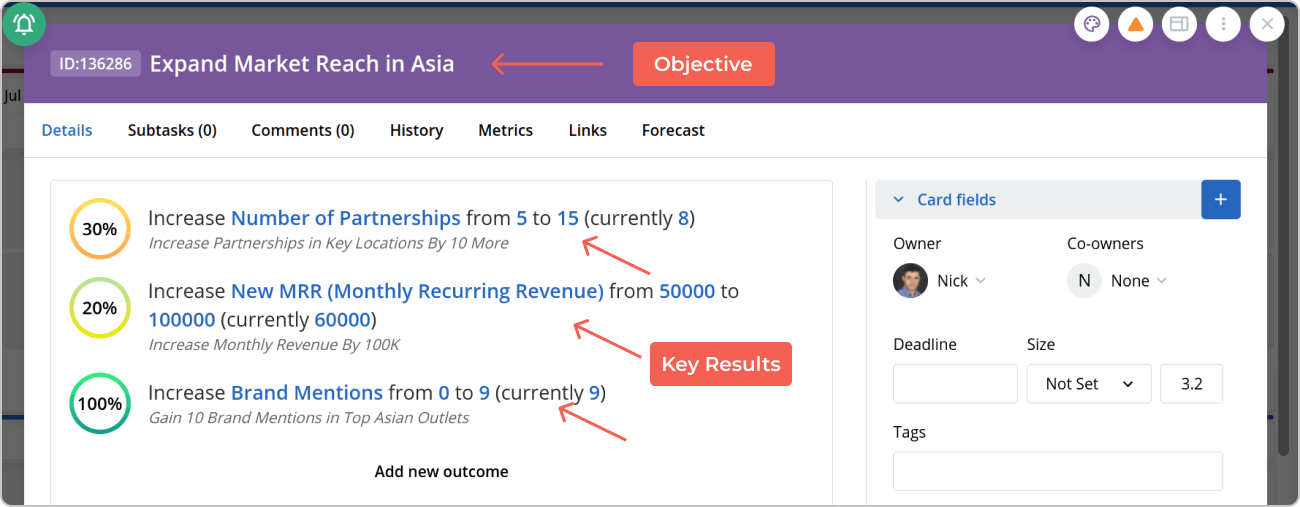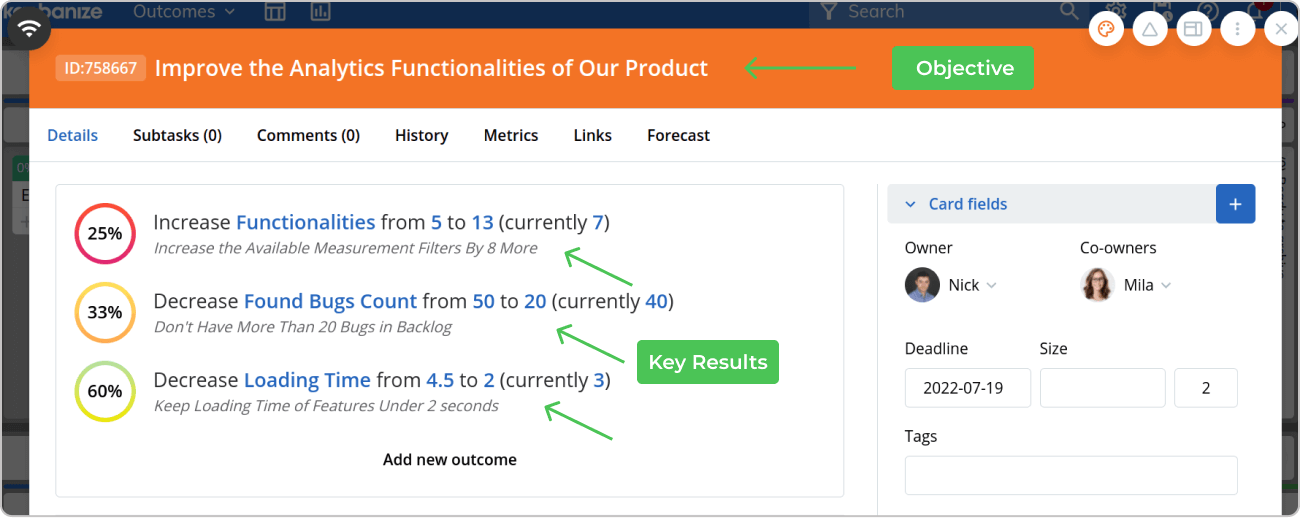Setting the right goals and paving the way to achieving them is critical for realizing long-term plans and following the laid-out strategic path of organizations. Goal-setting techniques such as the OKR framework provide an in-depth look into company plans and offer a way to monitor and measure completion in a very intuitive manner.
Let's discuss some good practices for writing OKRs and share some industry-specific OKR examples to get you started.
What Is the OKR Format?
The structure of the OKR model consists of 2 main components - Objectives and Key Results.
- The Objective is a concise, inspirational, and ambitious statement representing your goal.
- Key Results are a few quantitative, measurable, and specific actions to help you track the completion of the Objective.
 The OKR formula
The OKR formula
Good Practices to Structure Effective OKRs
When it comes to writing effective OKRs, be sure to clearly define and distinguish the Objective from the Key Results. Remember, Objectives describe “what you want to achieve,” while Key Results describe “how are you going to measure if you’re achieving the objective?”
Asking the right questions is great for setting your objectives and key results.
Use the following questions when setting your Objectives:
- What is the priority for the organization or team?
- What are the goals we should set to support the long-term company vision?
- What strategic, team, or individual targets should we aim for?
Remember, you need transparent and cascading OKRs to better communicate your business priorities across the organization.
 Cascading objectives and key results
Cascading objectives and key results
Your Key Results statements should provide an answer to some of the following questions:
- How do we quantify the objective?
- How do we track and measure the progress?
- What are the indicators that the goal is achieved?
Even though the ultimate number of Key Results that can support an Objective is up to 5, typically, 2 or 3 statements are enough to measure your objective's success and keep your team's focus on the most critical deliverables.
Setting your first OKR examples will undoubtedly require some rewriting and adjusting, at least in the beginning. A good starting point is using the OKR formula, checking the OKR best practices, or using industry examples.
How to Use Our OKR Examples?
Let’s explore some specific OKR examples that employ the goal-setting technique on a team and organizational level.
To use our OKR examples, follow these steps:
1. Review the examples to get an idea of what effective OKRs look like.
2. Identify the goals and objectives that are relevant to your organization or team.
3. Use the examples as a guide to creating your own OKRs, ensuring they are specific, measurable, achievable, relevant, and time-bound.
4. Share your OKRs with your team and stakeholders to align everyone on your objectives.
5. Regularly review and update your OKRs to ensure you are making progress towards your goals.
Team and Company OKR Examples
Organizational OKRs represent the strategic direction of the company. Usually, companies define 3-4 ambitious goals for everyone to work towards achieving. Company OKRs can be set up on a quarterly or yearly basis. What’s more important is to review them regularly.
By establishing company OKRs, teams can establish their own set of objectives that align with the overall goals of the organization while still maintaining the independence to pursue their own growth and development. This approach empowers teams to operate autonomously while keeping their efforts focused on driving collective success.
Company OKRs Example
Implementing a company OKR strategy fosters a multi-dimensional approach that encompasses vital aspects, including the mission, vision, and business system integration. The primary goal is to set an ambitious objective that aligns with the company's mission and vision, complemented by attainable key results that are tailored to the requirements of individual departments and teams. By adopting a rigorous OKR strategy, organizations can bolster their strategic focus and achieve sustainable growth.
Objective: Expand market reach in Asia.
Key Result 1: Increase partnerships in key locations by 10 more.
Key Result 2: Increase monthly revenue of $100K.
Key Result 3: Gain 10 brand mentions in top Asian outlets.
 Visualizing company OKRs
Visualizing company OKRs
OKR Examples for Teams
A department or team's OKRs are meant to support long-term organizational goals. Team OKRs indicate the actions a team will execute and the required results of those activities, so they can really impact the strategic level. Department OKRs are usually set and reviewed quarterly; however, dynamic markets may require monthly OKR reviews. Let’s illustrate with a product team OKRs.
Objective: Improve the analytics functionalities of our product.
Key Result 1: Increase the available measurement filters by 8 more.
Key Result 2: Limit malfunctions/bugs in the backlog to 20.
Key Result 3: Decrease loading time of features under 2 seconds.
 Visualizing Team OKRs
Visualizing Team OKRs
Industry OKR Examples
The following industry OKR examples can help you build a good understanding of what the goals of your team should look like and how to measure their progress. Ensure that goal-setting is not an isolated activity performed by C-level managers or project leaders but rather a result of collective observations and input.
Product OKR Example
Objective Key Results (OKRs) play a crucial role in product management by aiding product teams to align their efforts with the company's objectives and user experience. Achieving this balance is a key aspect of developing effective product OKRs.
Objective: Make our UI the most user-friendly on the market.
Key Results:
- Conduct 10 usability testing experiments with customers.
- Get feedback from 40% of our customer base about different UI improvements.
- Achieve a Net Promoter Score of at least 9.0 before releasing the new user interface.
Project Management OKR Example
By using specific project management OKRs, project managers can align team members around common goals, track progress, and make data-driven decisions to improve project outcomes.
Objective: Improve the reporting process efficiency.
Key Results:
- Create 3 ready-to-use templates to report directly to stakeholders.
- Reduce the number of reporting meetings.
- Use a centralized system for reporting.
IT Operations OKR Example
IT operations professionals play a crucial role in ensuring the smooth functioning of the entire organization. However, one of their major challenges is to effectively prioritize tasks and initiatives that can drive growth and development. To address this, they use IT operations OKRs to align the operations team with the overall strategy and focus their efforts on the most important work. This enables them to channel their energy toward achieving measurable results that align with organizational goals.
Objective: Improve service infrastructure performance.
Key Results:
- Migrate service to a cloud environment.
- Reduce service downtime by 30%.
- Reduce the number of vulnerabilities by 50%.
Support OKR Example
Support OKR refers to a system of setting objectives and key results (OKRs) for the support teams within an organization. The support OKRs are designed to align the support team's goals with the overall objectives of the company and to measure the success of the support team in achieving those goals. The support OKRs may include metrics related to customer satisfaction, response times, issue resolution rates, and other key performance indicators that are relevant to the support function. The support OKR system helps to ensure that the support team is focused on the right priorities and working towards achieving the company's overall mission and goals.
Objective: Create a customer knowledge base/help center second to none.
Key Results:
- Reduce article re-works by 30%.
- Create guidelines for graphic content representation.
- Create video tutorials for illustrating the most frequently asked questions.
Engineering OKR Example
Engineers and software developers prioritize optimization and bottleneck reduction. In line with this, the OKRs for engineering teams should have a challenging goal of minimizing errors, improving user experience, and streamlining processes.
Outcome-based key results are more suitable for engineering teams since their roles are centered on performance rather than output, making it easier to validate their achievements.
Objective: Improve the predictability of software releases.
Key Results:
- Decrease the number of patches to 1 per month.
- Reduce the amount of blocked user stories by 40% to improve their flow.
- Improve release frequency to every 30 days.
Partnership OKR Example
Partnership OKR is a collaborative goal-setting framework used by two or more organizations or teams working together towards a common goal or objective. It involves setting specific and measurable objectives, identifying key results or milestones, regularly tracking progress, and making adjustments as necessary to achieve shared outcomes. Partnership OKRs can help improve communication, alignment, and accountability between teams and organizations and can be used in various contexts, such as joint ventures, strategic alliances, or cross-functional projects.
Objective: Expand strategic partnerships.
Key Results:
- Generate X revenue from partners.
- Establish 10 new partners by the end of Q4.
- Expand the Partnerships Acquisition team with 2 associates.
Product Marketing OKR Example
Product Marketing OKRs set measurable goals and tracks progress towards achieving those goals for product marketing teams. It helps in aligning the team's efforts with the overall goals of the company and making sure that they are working towards achieving those goals efficiently. The objectives can be around increasing sales, improving product awareness, or enhancing customer satisfaction, and the key results are the metrics that indicate progress toward achieving those objectives.
Objective: Encourage users to be more actively engaged with the product.
Key Results:
- Produce 10 onboarding videos.
- Create 10 “How To” tutorials for advanced users.
- Re-create all existing video tutorials to include the new product functionalities.
Marketing OKR Example
It is imperative for marketers to establish objectives that align with the main organizational objectives, with a specific emphasis on the fundamental performance drivers within the marketing domain. It is essential to evaluate whether a metric holds significance or is merely superficial when determining marketing OKRs.
Objective: Double the number of marketing qualified leads (MQS) by the next quarter.
Key Results:
- Produce 100 MQS from organic search.
- Produce 100 MQS from social media campaign.
- Produce 100 MQS from email marketing.
Finance OKR Example
It is essential to prioritize the outcome over the output approach in finance. When setting finance OKRs, it is vital to avoid relying too heavily on ambiguous, qualitative objectives that resemble tasks.
Achieving a balance between Key Performance Indicators (KPIs) and OKRs will prevent your goals from becoming overly subjective and ensure that your attention remains focused on the desired future outcomes.
Objective: Improve expense management reporting.
Key Results:
- Identify the most frequent expense types and create expense categories for everyone to use.
- Create expense templates and share them with everyone.
- Reduce the operational time required for expense reporting.
Sales OKR Example
Objective Key Results (OKRs) add a significant level of effectiveness to sales strategies. While numbers are critical performance indicators, they do not solely define a team's success. Therefore, it is important for sales OKRs to emphasize the impact of the numbers, including factors such as activity levels, efficiency, effectiveness, and structure. By doing so, sales teams can better understand their performance and identify areas for improvement.
Objective: Drive Monthly Recurring Revenue (MRR) by 15% for Q4.
Key Results:
- Increase our subscription size from 20k to 30k per month.
- Increase sales completion quotes by 30%.
- Generate 20% more SQLs.
HR OKR Example
The HR department is responsible for ensuring that each member of the organization is well-prepared and highly motivated to work towards achieving the vision and mission established by the executive leadership.
The use of OKRs provides a transparent framework that allows all employees to clearly understand the organization's core purpose, thus fulfilling their need for a sense of direction and meaning in their work.
Objective: Ensure faster and better onboarding of new employees.
Key Results:
- Interview the last 10 hired team members to identify issues with the onboarding process.
- Create an onboarding improvement plan to increase the satisfaction rate by 10%.
- Reduce internal onboarding process time from 14 days to 10 days.
Customer Success OKR Example
The role of customer success professionals is to facilitate the optimal use of your product or service among its users. Given that customer preferences and expectations evolve over time, the demands on the customer success team also need to adapt. This is where customer success OKRs come in, enabling a proactive and objective-driven approach to customer success. By setting and tracking goals that align with customer needs, the team can stay ahead of the curve and deliver outcomes that meet changing demands.
Objective: Provide first-class support to new paying customers.
Key Results:
- Increase the number of product -onboarding sessions per customer from 2 to 5 in the first week of the subscription.
- Increase the number of follow-up meetings by 10% per month.
- Conduct an anonymous survey after the onboarding process to improve the CSAT from “Satisfied” to “Very satisfied”.
OKR Examples Frequently Asked Questions (FAQ)
What Is an Example of OKR for Individuals?
An example of an OKR for individuals could be:
Objective: Improve professional skills and knowledge
Key Results:
1. Complete at least two online courses related to my field of work
2. Attend at least one industry conference or workshop
3. Participate in at least two mentoring/coaching sessions with a senior colleague
4. Write and publish at least one blog post on a relevant topic
5. Get a positive performance review from my supervisor that recognizes my improved skills and knowledge.
What Are Some Examples of OKRs Used by Successful Companies in the Tech Industry?
The list of successful OKRs stories is constantly growing. Here's how 4 giants in the tech industry used OKRs:
1. Google: Objective - Improve search quality; Key Results - Increase user satisfaction with search results, reduce search latency, improve indexing speed.
2. Amazon: Objective - Increase customer satisfaction; Key Results - Achieve a high Net Promoter Score (NPS), reduce customer complaints, and increase repeat purchases.
3. Facebook: Objective - Improve user engagement; Key Results - Increase daily active users, increase time spent on the platform, and increase the number of shares and comments on posts.
4. Uber: Objective - Expand into new markets; Key Results - Launch in X number of new cities, achieve X% market share in those cities, and increase revenue from those cities.
We offer the most flexible software platform
for outcome-driven enterprise agility.
Related Articles





